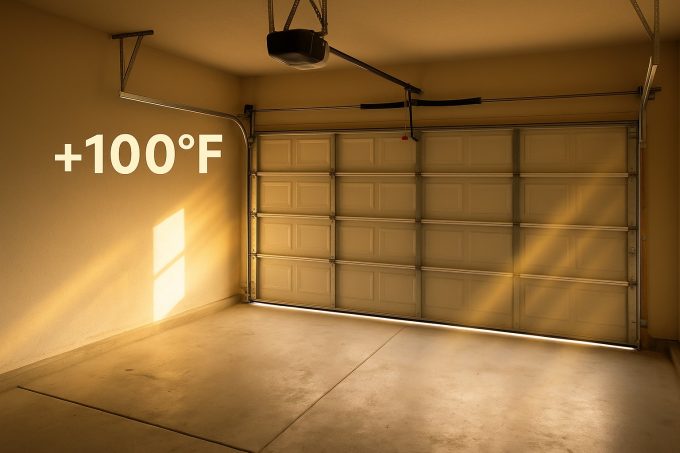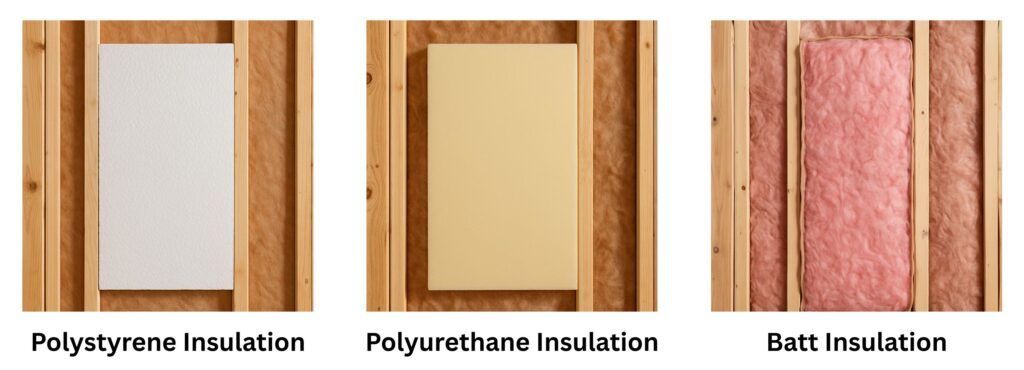What HVAC Pros Want You to Know About Insulated Garage Doors in Texas

In the heart of summer in Houston, TX, one of our clients reached out with a common complaint: their garage felt like a furnace, and the heat was bleeding into the rest of their home, raising indoor temperatures and skyrocketing their energy bills. After assessing the issue, we discovered their garage door was a non-insulated, thin, hollow panel with no insulation material to block the heat. We recommended installing an insulated garage door with high R-values, and within a month, the homeowner saw nearly a 20% reduction in energy loss and felt a significant improvement in indoor comfort.
This isn’t an isolated case. In fact, the U.S. Department of Energy reports that up to 30% of a home’s heating and cooling energy can be lost through the garage space, especially if the garage is attached to your home. In regions like Texas, with its intense summer heat and occasional cold winter fronts, this energy inefficiency can have a long-term impact on comfort and utility costs.
That’s why HVAC professionals across the state are stressing the value of insulated garage doors. Whether you’re driving a car into your garage after a long commute, working on a DIY project, or using it as a gym, insulation plays a key role in keeping temperatures stable. Let’s walk through why insulated doors are becoming essential, especially in Texas, and what HVAC experts want you to understand about this investment.
What Is an Insulated Garage Door?
An insulated garage door is built with multiple layers of material designed to reduce thermal transfer between the inside of your garage and the outside environment. These doors typically contain polyurethane or polystyrene foam insulation, sandwiched between durable layers of steel, aluminum, or even fiberglass. The more layers and the thicker the foam insulation, the better the R-value, a rating that measures how effective the insulation is at resisting heat flow.
While traditional non-insulated doors are often just a single sheet of steel or aluminum, insulated garage doors can consist of 2 or 3 layers, offering far better heat insulation and noise reduction. Popular garage door types include sectional doors, single-panel doors, and carriage-style doors, all of which can be upgraded with garage door insulation kits or built from scratch with thick insulation materials.
There are several insulation types used in garage doors, each offering different levels of efficiency:
- Polystyrene: Offers moderate insulating properties and is often used in lower-cost door insulation kits.
- Polyurethane: A urethane-based foam that provides higher R-values, superior noise reduction, and greater structural strength.
- Batt insulation or rigid foam boards can also be applied in DIY insulation kits, especially for older garage door products.
Why Insulated Garage Doors Matter in Texas
1. Beat the Heat and Stay Comfortable
In Texas, summer temperatures routinely exceed 100°F, and your garage space can become even hotter without proper heat insulation. HVAC pros emphasize that an insulated door acts as a thermal barrier, blocking the transfer of heat from outside into your garage. This protects not only your garage door opener components (like the logic board, light socket, and sensors) but also anything stored in your garage, including your car, tools, and temperature-sensitive equipment.

A garage door insulation upgrade can make your garage up to 20 degrees cooler in the summer and 10-15 degrees warmer in winter, creating a more functional and comfortable space.
2. Lower Your Energy Bills
When your garage is attached to your home, hot or cold air from the garage seeps into interior spaces, forcing your HVAC system to work harder. This leads to higher energy bills, increased wear and tear on your air conditioning unit, and more frequent breakdowns.
Installing an energy-efficient garage door with a high R-value helps maintain indoor temperature stability, reducing the workload on your HVAC system. Over time, the initial cost of upgrading to an insulated garage door pays off with significant energy savings, a better U-value, and a strong return on investment.
3. Protect Your Belongings from Extreme Weather
Your garage isn’t just a place to park your car. It may house tools, electronics, seasonal decorations, and even appliances like refrigerators or water heaters. These items can be damaged by extreme temperature fluctuations. Insulated garage doors protect the entire garage environment, acting as a barrier against weather extremes, humidity, and dust infiltration.
For businesses using garage space for inventory or as an extension of a warehouse, keeping the space stable is crucial. Commercial garage doors often use steel-reinforced panels filled with urethane foam to meet industrial-grade insulation standards.
4. Reduce Noise and Increase Peace of Mind
Not only does garage door insulation provide energy efficiency, but it also drastically reduces noise transfer. A well-insulated garage door dampens street noise, barking dogs, nearby construction, or even a neighbor’s loud car.
This is especially important if your garage is next to a bedroom or if you use the garage as a workshop or music space. Many brands like Clopay Garage Doors, Amarr Garage Doors, Martin Garage Doors, and Craftsman Garage Doors offer high-performance insulated garage doors with enhanced noise reduction features.
5. Boost Curb Appeal and Increase Home Value
Adding a new garage door, especially one that is insulated and styled to match your home’s exterior, can dramatically improve curb appeal. Most homebuyers now look for energy-efficient features, and insulated garage doors are high on that list.
Choosing from a wide range of materials such as fiberglass, aluminum, and steel, homeowners can find a door that fits their design goals without compromising on performance. With the right door type, insulation, and design, your garage can go from a hotbox or freezer to a year-round functional space and help increase your home’s resale value.
Understanding R-Values and Insulation Types: A Guide from HVAC Experts
R-value measures a material’s ability to resist heat flow. The higher the R-value, the better the insulation. For garage doors in Texas, experts recommend an R-value of at least 12, especially for attached garages or garages with rooms above them.
Here’s a quick look at insulation types and their performance:
- Polystyrene panels (usually around R-6 to R-9) are cost-effective and easy to install with insulation kits.
- Polyurethane foam (R-12 to R-18) offers superior insulation, structural strength, and noise control.
- Batt insulation and rigid foam panels are commonly used for DIY garage door insulation, but may not be as seamless or effective as factory-insulated doors.

You can also consider custom-built garage doors with integrated insulation tailored to your home’s specific needs and climate.
Debunking Common Myths About Insulated Garage Doors
“I don’t use the garage often, so I don’t need insulation.”
Even if your garage is rarely used, the connected areas of your home are still affected by the temperature swings. Insulation provides a buffer, making the whole home more comfortable.
“Insulated doors are too expensive.”
While the initial cost of an insulated garage door may be higher, the energy savings, reduced HVAC maintenance, and extended product life of your garage door opener and other components often result in a much higher return on investment.
“Texas doesn’t get that cold.”
While winter may be mild, even short cold snaps can cause discomfort and increase heating bills. Insulation works both ways it protects against summer heat and winter chill, making it a year-round solution.
How Can White Oak Overhead Doors Co. Help You?
At White Oak Overhead Doors Co., we specialize in delivering expert garage door installation, repair, and maintenance for insulated garage doors across Houston and nearby communities. Whether you’re replacing a worn-out single door, upgrading to a modern sectional door, or installing an energy-efficient solution for your new home or business, we have you covered.
Here’s what sets us apart:
- ✅ Customized Insulated Door Options: Choose from a wide range of garage door types, styles, and insulation materials, including polyurethane, polystyrene, and steel panels.
- ✅ Expert Technicians: Our experienced team is trained to handle everything from garage door opener logic board repairs to complete garage door system overhauls.
- ✅ Free Estimates & Consultations: We’ll assess your current setup and provide detailed options based on insulation types, R-values, and budget.
- ✅ Trusted Products: We work with top brands like Clopay, Amarr, Martin, Craftsman, and Chamberlain Garage Doors for long-lasting performance.
- ✅ Emergency Services Available: We handle everything from damaged panels to malfunctioning openers, even during extreme weather.
📍 Visit Us: 1440 Studemont St, Houston, TX 77007
📞 Call Now: (832) 990-1595
Ready to transform your garage into a more comfortable, efficient, and valuable space?
Call White Oak Overhead Doors Co. today for a free estimate and expert guidance.
Let us show you how garage door insulation can go a long way not just in energy savings, but in total home comfort and peace of mind.
Frequently Asked Questions (FAQs)
1. Can I add insulation to my existing garage door instead of replacing it?
Yes, you can use garage door insulation kits with rigid foam or batt insulation, but the results won’t match the performance of a factory-insulated door.
2. Does garage door insulation help with pests or dust entering the garage?
Yes, insulated doors create a tighter seal, which helps reduce the entry of dust, pests, and outdoor debris into the garage.
3. How long does an insulated garage door last compared to a non-insulated one?
Insulated garage doors are generally more durable and can last 15–20 years or more with proper maintenance, often outlasting non-insulated options.
4. Is it worth insulating a detached garage?
Yes, especially if you use it as a workshop, home gym, or storage space — insulation helps maintain a consistent temperature and protects your belongings.
